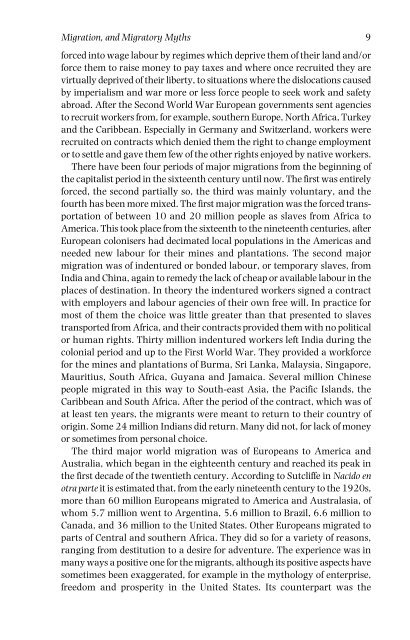Open%20borders%20The%20case%20against%20immigration%20controls%20-%20Teresa%20Hayter
Open%20borders%20The%20case%20against%20immigration%20controls%20-%20Teresa%20Hayter
Open%20borders%20The%20case%20against%20immigration%20controls%20-%20Teresa%20Hayter
You also want an ePaper? Increase the reach of your titles
YUMPU automatically turns print PDFs into web optimized ePapers that Google loves.
Migration, and Migratory Myths 9<br />
forced into wage labour by regimes which deprive them of their land and/or<br />
force them to raise money to pay taxes and where once recruited they are<br />
virtually deprived of their liberty, to situations where the dislocations caused<br />
by imperialism and war more or less force people to seek work and safety<br />
abroad. After the Second World War European governments sent agencies<br />
to recruit workers from, for example, southern Europe, North Africa, Turkey<br />
and the Caribbean. Especially in Germany and Switzerland, workers were<br />
recruited on contracts which denied them the right to change employment<br />
or to settle and gave them few of the other rights enjoyed by native workers.<br />
There have been four periods of major migrations from the beginning of<br />
the capitalist period in the sixteenth century until now. The first was entirely<br />
forced, the second partially so, the third was mainly voluntary, and the<br />
fourth has been more mixed. The first major migration was the forced transportation<br />
of between 10 and 20 million people as slaves from Africa to<br />
America. This took place from the sixteenth to the nineteenth centuries, after<br />
European colonisers had decimated local populations in the Americas and<br />
needed new labour for their mines and plantations. The second major<br />
migration was of indentured or bonded labour, or temporary slaves, from<br />
India and China, again to remedy the lack of cheap or available labour in the<br />
places of destination. In theory the indentured workers signed a contract<br />
with employers and labour agencies of their own free will. In practice for<br />
most of them the choice was little greater than that presented to slaves<br />
transported from Africa, and their contracts provided them with no political<br />
or human rights. Thirty million indentured workers left India during the<br />
colonial period and up to the First World War. They provided a workforce<br />
for the mines and plantations of Burma, Sri Lanka, Malaysia, Singapore,<br />
Mauritius, South Africa, Guyana and Jamaica. Several million Chinese<br />
people migrated in this way to South-east Asia, the Pacific Islands, the<br />
Caribbean and South Africa. After the period of the contract, which was of<br />
at least ten years, the migrants were meant to return to their country of<br />
origin. Some 24 million Indians did return. Many did not, for lack of money<br />
or sometimes from personal choice.<br />
The third major world migration was of Europeans to America and<br />
Australia, which began in the eighteenth century and reached its peak in<br />
the first decade of the twentieth century. According to Sutcliffe in Nacido en<br />
otra parte it is estimated that, from the early nineteenth century to the 1920s,<br />
more than 60 million Europeans migrated to America and Australasia, of<br />
whom 5.7 million went to Argentina, 5.6 million to Brazil, 6.6 million to<br />
Canada, and 36 million to the United States. Other Europeans migrated to<br />
parts of Central and southern Africa. They did so for a variety of reasons,<br />
ranging from destitution to a desire for adventure. The experience was in<br />
many ways a positive one for the migrants, although its positive aspects have<br />
sometimes been exaggerated, for example in the mythology of enterprise,<br />
freedom and prosperity in the United States. Its counterpart was the


